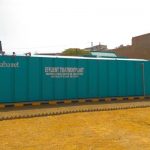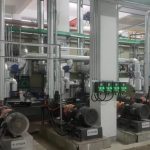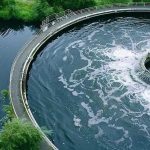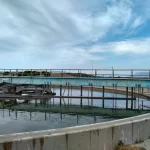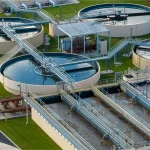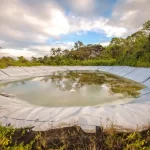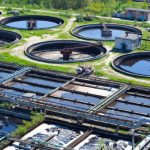-
-
Call for inquiry
-
B-21, Block-2, Gulshan-e-Iqbal
Karachi, Pakistan

Membrane Bioreactor (MBR) – Redefining Wastewater Treatment for a Sustainable Future
Introduction
With growing industrialization and urban expansion, Pakistan’s water resources are under severe stress. Industries, municipalities, and housing societies alike face the dual challenge of treating wastewater effectively while reducing freshwater consumption.
To meet these challenges, Abamet Pakistan brings advanced Membrane Bioreactor (MBR) technology – a revolutionary wastewater treatment process that combines biological degradation and membrane filtration to produce ultra-clean, reusable water. This system represents the next generation of wastewater recycling, offering exceptional efficiency, compact design, and environmental sustainability.
What is the Membrane Bioreactor (MBR)?
The Membrane Bioreactor (MBR) is an integrated biological and membrane filtration system designed to treat municipal and industrial wastewater with unparalleled quality and reliability.
It merges the activated sludge process with membrane filtration (micro or ultrafiltration) – replacing the need for traditional secondary clarifiers. This integration ensures a much smaller footprint, higher effluent quality, and greater operational control compared to conventional systems.
Key Features:
- Compact and modular design ideal for space-constrained installations.
- Superior effluent quality – treated water is suitable for reuse in process, irrigation, or cooling systems.
- High biomass concentration for faster and more effective treatment.
- Low sludge production and minimal maintenance requirements.
- Fully automated operation with minimal operator involvement.
These advantages make MBR the preferred choice for industries and communities aiming for zero liquid discharge (ZLD) and water reuse applications.
Pioneered by Abamet Pakistan
As a leading innovator in wastewater treatment and water recycling solutions, Abamet Pakistan has been at the forefront of introducing MBR technology to local industries. Through custom-engineered systems, Abamet ensures that each installation meets the unique hydraulic, biological, and spatial requirements of its clients.
From compact containerized units for small industries to large-scale municipal systems, Abamet’s MBR solutions are designed for efficiency, durability, and compliance with NEQS and international discharge standards.
How MBR Works
- Biological Treatment:
Wastewater first enters the bioreactor, where microorganisms break down organic matter and nutrients. - Membrane Filtration:
The mixed liquor is then passed through semi-permeable membranes that physically separate clean water from solids and pathogens. - Effluent Reuse:
The resulting crystal-clear, pathogen-free effluent can be reused safely for industrial processes, irrigation, or discharge into natural water bodies.
This combination ensures superior treatment performance, reliable operation, and consistent water quality – even under fluctuating loads.
Applications of MBR Systems
- Industrial Wastewater Recycling – Textile, food, beverage, pharmaceutical, and chemical industries.
- Municipal Sewage Treatment – Housing societies, urban clusters, and smart cities.
- Commercial Complexes and Hotels – On-site compact wastewater treatment and reuse.
- Zero Liquid Discharge (ZLD) Systems – Where treated water is completely recycled.
By enabling direct reuse of treated wastewater, MBR systems reduce dependence on groundwater and support sustainable water management.
Environmental and Economic Benefits
- Reduced Freshwater Demand: By producing high-quality recycled water.
- Low Footprint: Ideal for space-limited industrial or urban setups.
- Lower Operational Costs: Due to automation and reduced chemical usage.
- Regulatory Compliance: Meets and exceeds NEQS standards.
- Sustainability Alignment: Supports SDG 6 (Clean Water), SDG 9 (Innovation & Infrastructure), and SDG 13 (Climate Action).
These factors make MBR a cornerstone technology in Pakistan’s transition toward water-resilient infrastructure.
Abamet’s MBR Installations and Impact
Abamet has successfully delivered Membrane Bioreactor plants across Pakistan – helping industries and institutions achieve effluent reuse, reduced environmental footprint, and regulatory compliance.
Our clients in the textile, automotive, and food sectors are reusing thousands of gallons of treated water daily, conserving natural resources and cutting down on discharge costs. Each installation reinforces Abamet’s commitment to sustainability-driven engineering and local innovation.
Future of MBR in Pakistan
With water scarcity and urbanization on the rise, MBR technology is becoming essential for smart cities, industrial parks, and housing developments. Its adaptability, reliability, and efficiency make it a future-proof solution for Pakistan’s water challenges.
Abamet’s focus is to expand the use of MBR-based wastewater recycling plants across industries – helping businesses transition from linear to circular water systems while ensuring environmental compliance and long-term cost savings.
Conclusion
The Membrane Bioreactor (MBR) represents the future of sustainable wastewater management – merging advanced engineering with environmental responsibility.
With Abamet Pakistan’s expertise and local innovation, MBR systems are empowering industries and communities to reuse water, reduce pollution, and restore balance to the environment.Cleaner water. Smaller footprint. Sustainable tomorrow.
That’s the power of MBR – and the promise of Abamet.

